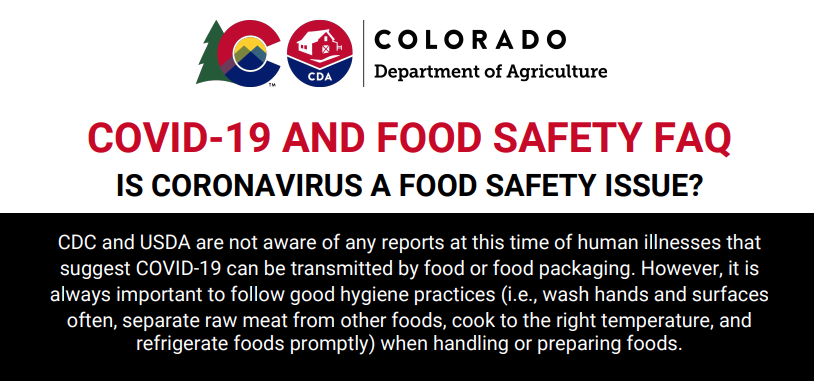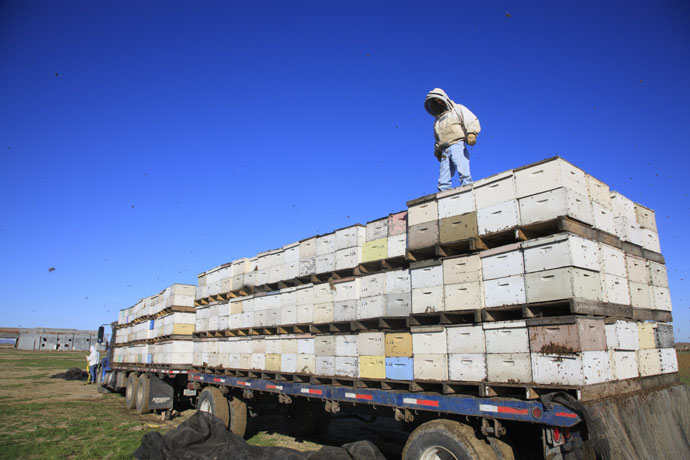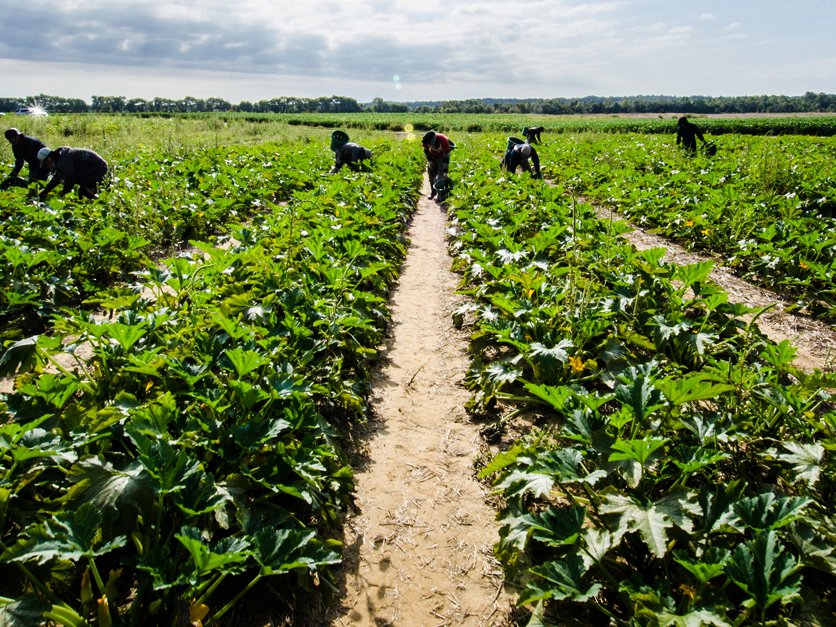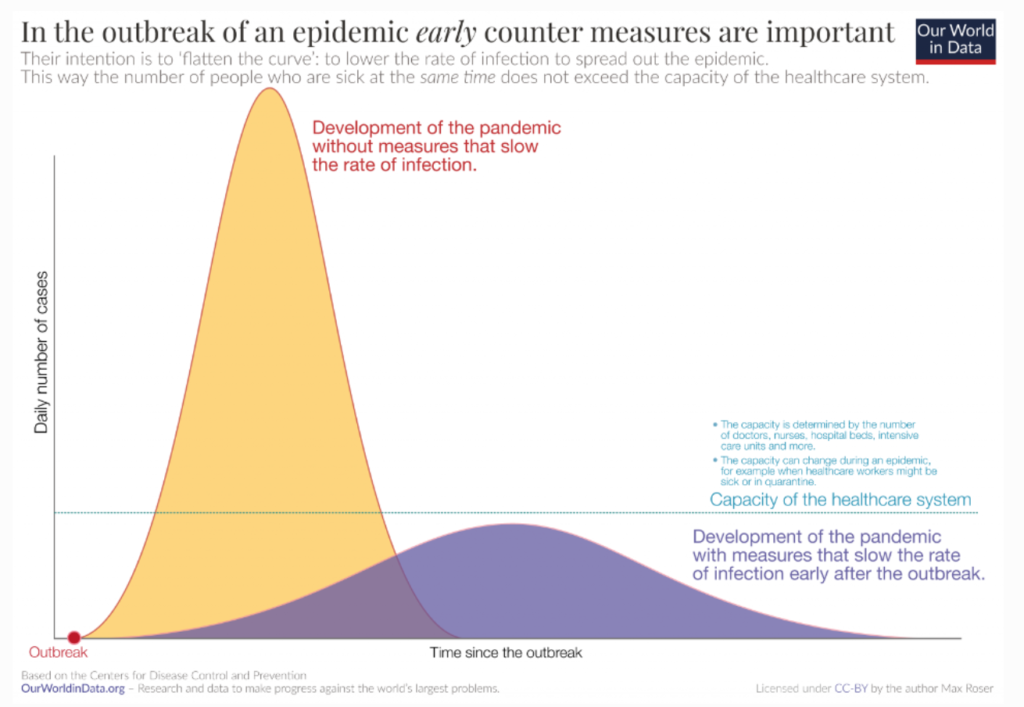This is a challenging time for all of us. Coloradans are trying to figure out how to navigate the situation, and the toll it takes on all of us can be overwhelming. There is help. If you or someone you know is struggling, please contact Colorado Crisis Services: 1-844-493-8255 or text “TALK” to 38255.
Colorado Farm Bureau members, please use the following resources to help prevent the spread of COVID-19 throughout Colorado and to ensure you, your family and your communities stay healthy. Colorado Farm Bureau believes we should be doing everything we can to protect rural America and urges rural residents to take COVID-19 precautions seriously. We are particularly concerned by the age of the primary risk group when compared to the average age of farmers. Older adults and people who have serious chronic medical conditions are most at risk.
COVID-19 Aid Package Critical for Agriculture
The coronavirus aid package negotiated by Sen. Mitch McConnell (R-KY) and agreed to by Senate leaders and the White House will help ensure farmers and ranchers are able to continue feeding America in the midst of the COVID-19 crisis.
“Thanks to Leader McConnell and all the senators who diligently fought for farmers and ranchers to ensure they have our backs in the unprecedented COVID-19 crisis.,” said Zippy Duvall, president of the American Farm Bureau Federation. “The aid to farmers in this package, including funding for the CCC and the Office of the Secretary, will allow USDA to begin crafting an appropriate relief program for agriculture.”
The agreement reportedly includes a $14 billion increase in USDA’s borrowing authority under the Commodity Credit Corporation, consistent with a long history of the CCC being tapped to responsibly support agriculture in times of crisis, and $9.5 billion to assist specialty crop producers, direct retail farmers and livestock operators.
Click here to read more about the available funding for farmers and ranchers.
Agriculture and Coronavirus

The Coronavirus or COVID-19 is impacting the entire U.S. and global economy, and agriculture is no exception. But while some challenges persist, agriculture is well-positioned to continue to produce food and commodities through the length of this crisis. Colorado Farm Bureau and Farm Bureau’s across the country are working with state and federal officials to ensure they have the information they need to keep food production up and running.
Officials thus far have understood the necessity of agriculture, and the sectors that help keep it operating are critical to the economy and to public health. Ag groups like Farm Bureau will continue to work with officials to ensure the industry has access to much-needed supplies of labor, agricultural inputs, and professional services in order to continue into the 2020 growing season in as normal a fashion as possible.
A ‘Critical’ Industry

The federal government has declared that agriculture is a “critical” industry who’s operations, “have a special responsibility to maintain [their] normal work schedule,” according to President Trump. The announcement was issued by the Department of Homeland Security and is advisory in nature but designed to assist state and local governments in implementing virus response plans. The guidance outlines agriculture-related activities including everything from farm operations and workers, to workers engaged in carrying out agricultural government programs, to workers and businesses engaged in the manufacture and repair of farm equipment.
Colorado Follows Federal Guidance on Agriculture
On March 22nd, Governor Polis identified agriculture as “critical” to the state of Colorado and therefore not subject to many restrictions issued by his administration in response to COVID-19. The order identifies various industries as exempt from the order to reduce in-person workforces by 50%.
In brief, the order includes:
- Critical Infrastructure definition of the following: “Food and plant cultivation, including farming crops, livestock, food processing and manufacturing, animal feed and feed products, rendering, commodity sales, and any other work critical to the operation of any component of the food supply chain.”
- Critical Healthcare Operations include veterinary care and livestock services. There remains a limit on elective veterinary procedures to ensure sufficient PPE for human care.
- Food and Agriculture supply chain items are included in Critical Manufacturing, including food processing for all foods and beverages; chemicals; medical equipment; and all other supporting business.
- Farm and produce stands, and “establishments engaged in the retail sale of food,” are included in the Critical Retail section. This includes farmers markets. This section also includes all agricultural supply businesses.
- Critical Services include important aspects of the Food and Agriculture supply chain, including storage and distribution.
Farm Bureau believes that the order, combined with guidance from the Department of Homeland Security is satisfactory to ensure that agriculture operations and critical agriculture services can continue to operate and produce our food
State Begins to Open Up w/ Flexibility for Local Communities
Governor Polis has announced that the “Stay-at-Home” order will expire on April 26, and move towards a “Safer-at-Home” phase, where some businesses and part of the economy will be able to open up with strict precautions. For most of the general public, that means the order to stay at home will be relaxed and people will now be encouraged to stay at home. This new measure still includes the following guidelines with flexibility for local communities to craft an individualized plan that works for their situation:
- Folks are still strongly advised to wear face coverings in public.
- Gatherings over 10 people will still be banned.
- Sick people should still avoid going to work.
- Older Coloradans and vulnerable populations still need to stay at home unless absolutely necessary.
- Elective medical and dental services may open with strict precautions and adequate personal protective equipment.
- Retail businesses are allowed to open for curbside delivery on April 27, and slowly phase in regular operations under strict precautions beginning May 1.
Click here for more information.
Agriculture is still open for business, and the Colorado Farm Bureau has created a document for members to use as a resource for their employees who may be traveling to and from work, between sites, or for other work-related purposes and feel that documentation is necessary.
The form is designed to help the agriculture workforce verify the purpose of travel in the event law enforcement or other officials question their reasoning for being on the road rather than at home.
***You may download the document here.***
Protecting Employees at Work
 Farms and ranches must stay healthy to stay in business. While COVID-19 continues to penetrate daily lives across the globe, industries of all types are trying to adjust to this new reality. Many businesses have been asked to close or significantly change the way they operate, but the federal and state governments have declared ‘critical’ industries remain operational. Agriculture is understandably included as a ‘critical’ industry and remains open for business to continue growing food to feed our communities, especially in times like these. However, it is critically important to understand that open for business, does not mean business as usual on our farms, ranches and food processing facilities.
Farms and ranches must stay healthy to stay in business. While COVID-19 continues to penetrate daily lives across the globe, industries of all types are trying to adjust to this new reality. Many businesses have been asked to close or significantly change the way they operate, but the federal and state governments have declared ‘critical’ industries remain operational. Agriculture is understandably included as a ‘critical’ industry and remains open for business to continue growing food to feed our communities, especially in times like these. However, it is critically important to understand that open for business, does not mean business as usual on our farms, ranches and food processing facilities.
Food Safety
Consumers should feel confident that the U.S. food supply is safe. There are no studies that indicate that COVID-19 can be transmitted through food but consumers are reminded to follow proper food preparation guidelines. The Colorado Department of Agriculture has created a fact sheet addressing common concerns about food safety.

Transportation Officials Relax Rules to Ensure Logistics Networks Continue to Operate Under Additional Stress

While there is no current supply shortage of food and food products, over-buying at retail outlets has created some instances of empty shelves or delays in shipping as wholesale suppliers shift their shipping to fulfill higher demand. With the closures of restaurants and hotels, food manufacturers are working to shift their supply chains from fulfilling demand from foodservice and institutional purchasers, to focus more on retail purchasers. Additionally, officials are working to ensure that food manufacturing and processing facilities can maintain access to their supply of packaging and processing inputs.
To aid in this smooth flow of goods, officials have made moves to relax rules on hours-of-service and weight restrictions for shippers carrying critical goods to ensure that the quickly changing supply and logistics chain can more easily keep up.
- The Federal Motor Carrier Safety Administration has temporarily waived Hours-of-Service rules for haulers carrying “food” and “immediate precursor raw materials… that are required and to be used for the manufacture of … food.”
- Colorado State Patrol has temporarily issued an order to limit enforcement of overweight vehicles if they are carrying emergency, medical or food supplies needed to fulfill the federal Emergency Declaration.
- CDOT has created an Emergency Response overweight permit for transporters carrying goods for “critical” industries.
As spring draws closer, and farmers and ranchers, suppliers, commercial applicators and other businesses gear up and hire new workers. Some are concerned about the state’s ability to process and grant Commercial Drivers Licenses and other permits amid an order to reduce in-person employees may be reduced. Farm Bureau is working with officials to ensure that state services that are important to agriculture continue to efficiently operate and allow producers to comply with relevant regulations.
Rural Hospitals at Risk

Rural hospitals have a limited capacity to treat critical care patients in the face of an outbreak in remote areas, and as much as Farm Bureau members can prevent the spread of the illness, they should do so. Healthcare providers cite the lack of needed supplies and equipment like gloves, facemasks, and respirators as additional stressors on rural healthcare facilities. Rural hospitals from Idaho to Colorado and Wyoming are already facing pressure and reporting lack of test kits, equipment and staff according to the Wall Street Journal. The town of Lander, WY is even facing a population with infection rates approaching those in New York. In consultation with rural healthcare experts, CFB recommends curtailing all non-essential travel to the Front Range and especially any county with confirmed cases of COVID-19.
COVID-19 Could Impact Ag Workers

The U.S. State Department revised its restrictions on the processing of visa applications submitted by farm workers in Mexico after hearing concerns that the restrictions would lead to a farm worker shortage in the U.S.
Consular officers can now waive the visa interview requirement for eligible first-time and returning H-2A and H-2B applicants, making more workers in the H-2 program available while prioritizing public health.
Previously, the State Department had suspended temporary worker H2A visa processing in Mexico and other countries.
Labor is still critical to farms and ranchers during this time and Colorado Farm Bureau along with the American Farm Bureau Federation will continue to monitor the situation.
Farmers with questions about the changes to H2A processing can visit www.farmers.gov/manage/h2a for more information.
COVID-19 Impact on CFB
CFB staff in-person meetings have been suspended when possible and are working to limit in-office time. We are encouraging staff to limit contact and self-record whereabouts in the event of exposure coupled with the long incubation period of the illness. At this time, additional details are being monitored on a day-to-day, hour-by-hour basis.
- The Who’s Who in Colorado Agriculture reception has been postponed until August.
- Ag Day has been canceled.
- The Farm Bureau Legislative and Leadership Conference is canceled, we encourage county leaders to continue to participate in the bi-weekly advisory committee conference calls for policy updates.
The American Farm Bureau Federation has closed its Washington D.C. office until April 10 and is working remotely. AFBF is holding frequent web-meetings to coordinate with state staff on the outbreak response.
Flatten the Curve
Here’s a quick explanation of why it’s so important to cancel events, stop traveling and distance yourself socially. This dynamic is especially important in rural areas where healthcare services and equipment and manpower are limited and the ability to treat a large number of patients at one time is much lower than in urban areas.
For more information on COVID-19 and for best practices in preventing the spread of the illness and for updated information on confirmed cases, please consult the Center for Disease Control website and the following resources:
- Center for Disease Control: https://www.cdc.gov/coronavirus/2019-ncov/index.html
- Colorado Information and Updates on Confirmed Cases by County: https://www.colorado.gov/pacific/cdphe/2019-novel-coronavirus
- Global data of COVID-19 confirmed cases: https://coronavirus.jhu.edu/map.html
- General Information about COVID-19: https://www.hopkinsmedicine.org/health/conditions-and-diseases/coronavirus/coronavirus-facts-infographic
- Breaking the myths and combating the rumors about COVID-19: https://www.fema.gov/coronavirus-rumor-control
- New digital resource from USDA and Rural Affairs: https://rd.usda.gov/coronavirus
Beware of Scammers
Unfortunately, the rise of COVID-19 has brought along the rise in scams and predatory efforts. Be careful when receiving emails and advertisements and be sure to double check that they come from a trusted source. Use extreme caution before clicking on any link.
Please, be sure to use trusted sources such as the CDC or the Colorado COVID-19 Resource Site to find information about the virus and when dealing with personal information such as finances or medical records, be sure the sites you visit are your trusted vendors like Farm Bureau Bank or your regular lender.
Please refer to the resources above for accurate information and trusted sources. Don’t get caught in the scams!




